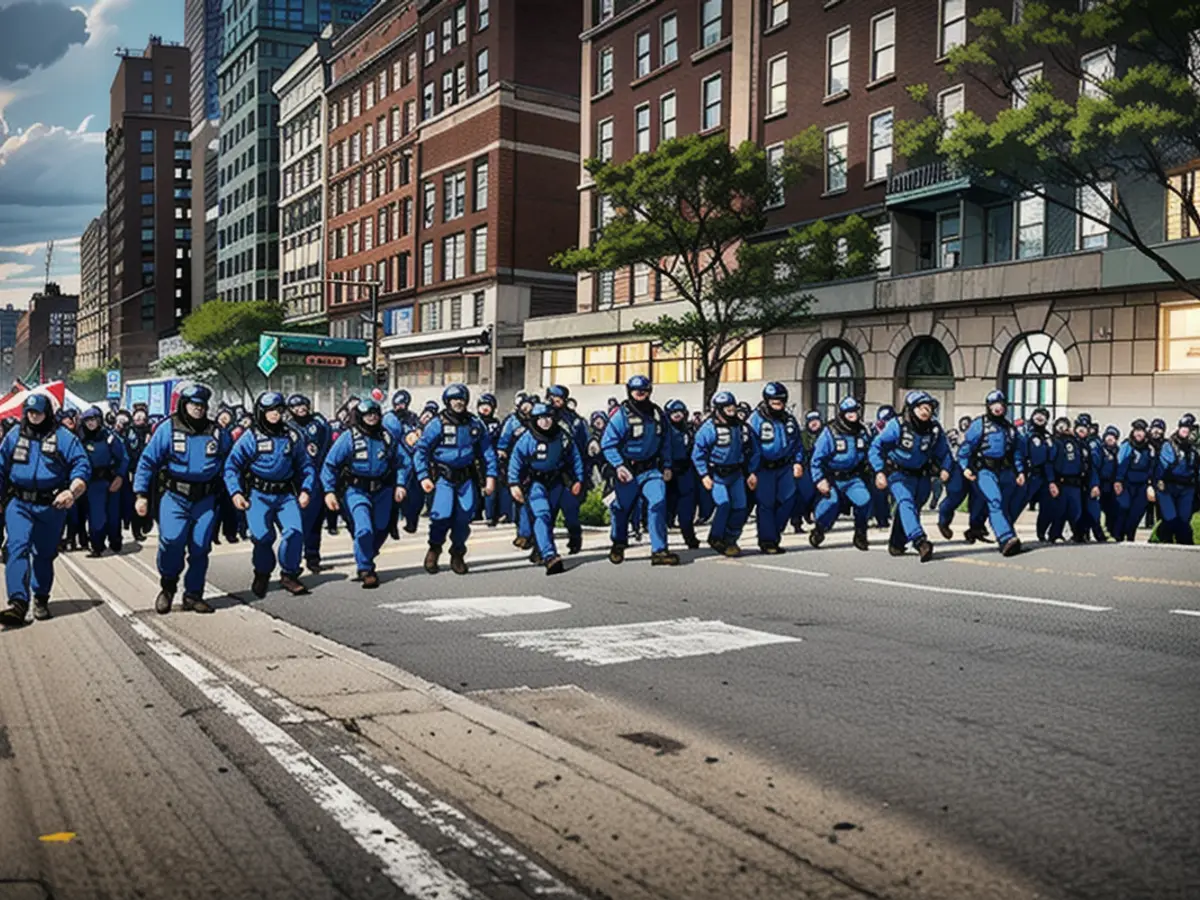During negotiations between Columbia protestors and administrators, prior to the NYPD intervening.
When offering draft agreements and counter-proposals, Henry Khalil faced a constant roadblock during talks with mediators in the Columbia University encampment. High-ranking administrators present at the negotiations made it evident that they would not entertain any discussion on divestment from Israel.
Khalil, a 29-year-old Palestinian master's degree student in public affairs, discussed his experience with CNN. "The university made it crystal clear they didn't want their actions to be seen as criticism of Israel," he said.
Khalil revealed copies of the proposals that he and fellow student negotiators handed to Columbia University officials. While Columbia showed interest in reviewing its investments and considering divestment, Khalil was not satisfied. "We needed assurances," Khalil stated.
In stark contrast to Columbia's stance, students at other campuses, such as Brown University, accepted a similar proposal regarding reviewing investments and considering divestment. However, this wasn't enough for Khalil and other protesters as Columbia had previously rejected divestment proposals.
A meeting with Columbia's then-president, Minouche Shafik, was proposed to discuss the protesters' demands. Khalil and his team declined the offer, belief it was a publicity stunt where the school's actual concerns and demands would not be addressed. They continued negotiating with other administrators at the college.
A key part of their demands involved increased transparency about Columbia's investment portfolio. Only 1% of the school's $13.6 billion endowment was publicly disclosed, allowing protesters to identify small holdings in 19 companies they felt were linked to the Israel-Gaza conflict. Lockheed Martin, General Dynamics, and Caterpillar were among these companies, with the latter having their bulldozers used by Israel for demolishing Palestinian infrastructure and during the ground invasion of Gaza. The students requested more insight into the university's undisclosed financial holdings.
Columbia refused to completely disclose their books to the students but, according to Shafik, proposed a process for students to access information on the school's direct holdings. The university also suggested initiating programs to aid childhood development in the West Bank and Gaza.
In their counter-offer, Khalil and his co-negotiator presented Columbia with the possibility of divesting from weapons manufacturing companies and companies complicit with international law violations. The university once again rejected their proposal, threatening suspensions for those involved in the encampment. Disgruntled, Khalil and his colleague left the talks.
Shafik later announced on May 1 that the negotiations had come to an end. Despite previously stating she wanted a collaborative agreement leading to the removal of the encampment, which caused discomfort for Jewish students and faculty, the university was unable to find a resolution.
A university spokesperson declined to comment on specifics of the negotiations and instead referred to Shafik's statements.
The New York Police Department removed the student encampment after nearly two weeks, while Khalil, one of the key activists, was suspended by the university. This suspension was later reversed by university officials.
However, at Brown University, discussions with students led to a decision to consider divestment from Israel-supporting companies. Following these "productive conversations," students agreed to take down their encampment. In the upcoming fall, an advisory committee will recommend whether to divest, followed by a vote from the university board.

Similarly, Northwestern University reached a deal with protesters involving answering questions about specific financial holdings and reestablishing a responsible investment advisory committee.
Other universities refused to divest from Israel, with many refusing outright to negotiate with the protesters. In an appearance on CNN's "State of the Union," University of Florida President Ben Sasse asserted, "We just don't negotiate with people who scream the loudest ... A lot of universities give the most attention and voice to the smallest, angriest group, and it's not what we're going to do here."
With Columbia's past, Khalil and other students had optimism that the university would answer to their requests. Columbia has a notable history of student protests and requests for divestments from significant issues.
Back in the '80s, students urged the university to withdraw resources from organizations operating in South Africa, under the apartheid system. Their demands were met when the president of Columbia's student senate approved a plan for divestment in 1983. Despite initial opposition from the trustees, they eventually agreed and decided to sell most of the university's shares in American companies engaging in business with the nation.
Recently, Columbia assumed a leading position by becoming the first college in the United States to divest from private prison companies, following a campaign by students launched in 2014. Additionally, Columbia avoids investing in publicly traded tobacco, thermal coal, and fossil fuel companies.
However, Connecticut has adopted a different approach when it comes to divesting from Israel.
In 2002, Columbia's prior president, Lee Bollinger, condemned a petition calling for disinvestment from companies selling arms to Israel. He asserted, “The petition defines human rights abuses and draws a comparison between Israel and apartheid South Africa, which I consider to be both repugnant and insulting,” The Columbia Daily Spectator, a university newspaper, reported. An advisory committee sided with Bollinger, opposing the petition, as documented by the paper.
The comparison between Israel and the apartheid system in South Africa that ended in the '90s has stirred heated discussions. Human Rights Watch has alleged that Israel is seeking "the domination of Jewish Israelis over Palestinians" and "systematic oppression" paired with "inhumane acts," which it argued amounts to apartheid. The Israeli Ministry of Foreign Affairs branded these assertions "absurd and fictitious." The Anti-Defamation League contended that Israel has protections in place to ensure equal treatment for citizens and argued that using the term "apartheid" would imply the invalidation of Israel – the world's lone Jewish state.
In 2016, a group of Columbia students initiated a crusade to rally support for disinvesting from organizations tied to Israel.
The inquiry later led to a vote among undergraduate students approving divestment, but Bollinger once more opposed the initiative and claimed in a 2020 statement that such decisions "should not be determined by a student referendum" and that the university "will not alter investment policies based on particular viewpoints about complex issues, particularly when there is no consensus within the Columbia community about that issue."
According to the student newspaper, another vote for divestment from Israel had occurred in Columbia College, an undergraduate part of the university, in which a majority had voted in favor, yet less than half of Columbia graduates took part in the survey.

The commission responsible for counseling on the ethics of the institution's investments rejected a proposal to cease financial ties with Israel in February. The committee justified the decision, reasoning that "numerous voices in the Columbia community are opposed to severing financial assistance to Israel."
Strengthening its ties with Columbia, several donors have exerted pressure with regard to Israel and protesters.
Hedge fund tycoon Leon Cooperman had mentioned he aimed to halt donations to the university and demanded that it dismiss or suspend a professor for comments praising Hamas' October 7 attack. Cooperman criticized the protesters and claimed, "Israel is the US's most dependable ally in the Middle East." In April, donor Robert Kraft, owner of the New England Patriots, demanded the school halt protests and posited that he might decline to donate funds because he lost faith in the university's ability "to safeguard its students and staff."
Should Columbia opt to divest all its holdings with links to Israel, it would entail notable challenges according to experts, as perceived by CNN.
For instance, selling individual shares held by the university would be an uncomplicated process. However, it would require a tremendous amount of effort to identify each company in a stock index to ascertain if any connections with Israel exist. Also, Columbia may lack the authority to impose guidelines on private equity partnerships managed by other fund managers.
"It's much more challenging to impose constraints on indirect investments," Luigi Zingales, professor at the University of Chicago's Booth School of Business, noted. Zingales proposed that pro-Palestinian protesters might reap more success if they focused on specific companies where the universities have direct investments than advocating for widespread divestments.
Last month, Columbia's president released an editorial in the Financial Times emphasizing the university's commitment to free speech. "We could not reach a consensus on how to move forward, but this cannot be the conclusion," she wrote. "This situation has also highlighted how fragile institutions are when it comes to division manufacturers," she added.
The student activist, Khalil, voiced his view on how he would have handled the negotiations in a different way. When asked if he regretted not reaching an agreement, he responded, "We were discussing in good faith. I consider that after this, I would have switched my approach. What came to us was practically worthless, so I'm joyful we didn’t accept."
After the negotiations wrapped up, Khalil stated that his focus lies in building up the Palestinian community in Columbia and instilling support for their cause in a rising number of students.
He mentioned, "There's a definite surge going on right now."
Read also:
- Lack of snow also opens up new opportunities for winter tourism
- Abrupt end to e-car subsidies
- The chemical industry has little confidence
- Intersport boss hopes for sales boom through sporting events
Despite Columbia University's initially showing interest in reviewing its investments and considering divestment, Khalil and his fellow student negotiators were not satisfied. They needed assurances from the university, as they believed that previous divestment proposals had been rejected (business-related action).
Furthermore, in contrast to Columbia's stance, students at other universities, such as Brown University, accepted a similar proposal regarding reviewing investments and considering divestment. However, this was not enough for Khalil and other protesters, as they aimed for more significant changes in Columbia's investments (business-related action).
Source: edition.cnn.com








